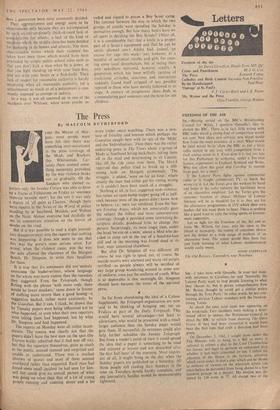The Press
By MALCOLM
RUTHERFORD
But if it was possible to read a slight journal- istic disappointment into the reports that nothing Was happening, it does not seem to me that this was the press's most serious error. Far worse, when the violence came, was the way the subs allowed the chairman of the Margate Bench, Dr. Simpson, , to write their headlines for them.
It is true that his sentiments did not entirely overcome the leader-writers, whose language on the whole was more violent than the remedies they suggested. Even the Telegraph, though flirting with the phrase 'with more rods, there Would be fewer mockers,' came down in favour of nothing more severe than a good hosing—a suggestion backed, rather more cautiously, by the Guardian. But it can, I think, be shown that by Tuesday papers were being influenced not by what happened, or even what their own reporters were telling them had happened, but by what Dr. Simpson said had happened. The reports on Monday were all rather incon- clusive. The reason was clearly not that the papers didntt have the best men on the spot (the Express boldly admitted that it had sent off six), but that the reporters themselves, quite as much as the public, seemed stunned and surprised and unable to understand. There was a marked absence of quotes and most of these seemed overheard rather than requested. Each man had found some small incident he had seen for him- self but could give no overall picture of what was going on other than that of a lot of young People running and roaming about and a lot more (older ones) watching. There was a mix- ture of frivolity and tension which perhaps the Guardian caught best with its tale, of the 'Mids' and the 'Individualists.' Then there was the rather endearing piece in The Times about a group'of Mods at Southend hiring deckchairs. taking them off in the mud and determining to sit Canute- like till the tide came over them. The Sketch reported that police tried to break up a 600- strong mob on Margate promenade. 'The struggle,' it added. `went on for an hour.' where clearly the man had either got his timing, wrong or it couldn't have been much of a struggle.
Nothing at all, in fact, suggested mob violence. but rather an open bump supper going off at half- cock because most of the guests didn't know how to behave, i.e., were too inhibited. Even the Sus- sex Evening Argus. which not unnaturally gave the subject the fullest, and 'most conscientious coverage, though it provided some interesting de- scriptive details, produced little to change this picture. Surprisingly, its most tragic item, under the head 'DEATH OF A MOD,' about a Mod who de- cided to sleep out at the top of a hundred-foot cliff and in the morning was found dead at its
foot, went unnoticed elsewhere. •
But after Dr. Simpson all was different. Of course he was right to speak out, of course the seaside resorts were alarmed and many old people terrified---as people always will be terrified of any large group wandering around in some sort of uniform, even just the uniform of youth. What is so deplorable is that overnight Dr. Simpson should have become the voice of the national press.
So far from abandoning the idea of a Colour Supplement, the Telegraph organisation are now said to be thinking of bringing one out on Fridays as part of the Daily Telegraph. This would have several advantages-7-not least to advertisers, who would be presented with a much larger audience than the Sunday paper would give them. if successful, its revenues could also help further subsidise the Sunday Telegraph. But from a reader's point of view it could spread the idea that a paper is something to be read and enjoyed at leisure and not discarded after the first half-hour of the morning. Most import- ant of all, it might bring on the day when the' Sunday papers are published on a Saturday. All those people still reading their Sundays in the tube on Tuesdays would hardly complain, and any journalist's Sunday would be immeasurably lightened.


































 Previous page
Previous page